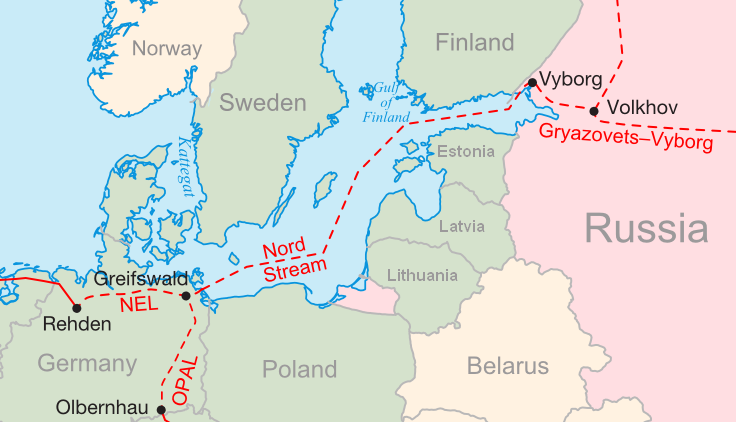Nord Stream 2 may well be the most controversial construction project in the world. The 1,200 kilometer pipeline, extending from Northwestern Russia to Northeastern Germany via the Baltic Sea, has alarmed European and American leaders alike. Critics of the project, which will supply Europe with 55 billion cubic meters of natural gas annually upon completion, worry that the EU’s increasing reliance on Russian energy poses significant national security risks. Furthermore, by allowing gas to flow directly to Germany, Nord Stream 2 has severe economic consequences for Ukraine, who would otherwise be compensated for transporting gas across its borders.
The German government, on the other hand, has vigorously defended the project, with Chancellor Angela Merkel emphasizing the commercial importance of the pipeline while downplaying its geopolitical implications. Yet despite protests from EU leaders, Germany, Denmark, Sweden, and Finland have all given Nord Stream 2 the green light. Today the project is over 94% complete.
In the hopes of using economic pressure to stop the completion of Nord Stream 2, the US Congress approved sanctions against any company involved with the construction of the pipeline in December 2019. The European Union—and German leadership, in particular—responded with outrage over Washington’s decision, with EU Trade Commissioner Phil Hogan arguing that the US was unjustly punishing companies conducting “legitimate business” with Russia.
In light of US sanctions, every European firm involved with this project has dropped out, leaving the state-owned Russian oil giant Gazprom—who many believe is controlled by Prime Minister Vladimir Putin himself—to construct the last 160 kilometers of the project on its own. While the absence of European firms will certainly delay the completion of the pipeline, American sanctions fall short of stopping its construction. Despite setbacks, Gazprom anticipates that Nord Stream 2 will be operational by early 2021.
In other words, the US-imposed sanctions accomplished two things: they embittered European allies and pushed the completion date of Nord Stream 2 back by a matter of months.
This is not to say that Americans and Europeans alike should avoid protesting against the pipeline’s construction. Despite Germany’s claims that Nord Stream 2 is a purely commercial endeavor, it is undeniable that the pipeline would increase European dependence on Moscow for natural gas: once completed, Nord Stream 2 would double the current annual supply flowing in from Russia. At the same time, the project threatens to cut Ukraine out of the continent’s energy market, potentially causing billions of dollars’ worth of losses to its economy by allowing Russia to circumvent transit fees and supply gas directly to Germany.
Not to mention the troubling consequences that will result when the pipeline is completed–in return for gas, Western Europe and Germany will be providing Russia with capital that could certainly end up in the wrong hands. Who is to say that the euros flowing in will not be put toward spreading disinformation and meddling in other countries’ elections? There is even a possibility that this money could fund the Russian military’s campaign against Ukraine, who will already be suffering as a result of the pipeline.
While the concerns over Nord Stream 2 are indeed legitimate, and opposition to its construction is warranted, the American response of sanctioning European and Russian firms alike was a flawed strategy. For starters, Washington did not take action until far too late. By the time Congress approved sanctions, less than 10 percent of the pipeline remained to be built. It was naïve to expect that both Russia and the EU would abandon this project so late in the game. Gazprom’s pledge to continue construction—even without European support—confirms this.
In addition, placing sanctions on companies based in the EU is a reckless tactic that puts unnecessary strain on American relations with key trading partners and military allies in Europe. And while the EU opted to not retaliate by imposing its own sanctions on the US, the possibility of such a response is deeply concerning. The last thing the world needs is another trade war, especially one between the US and the European Union. Finally, American sanctions united Germany and Russia in their mutual outrage, offering a glimpse of an unlikely yet extremely problematic potential alliance.
An effective American strategy for shutting down the construction of Nord Stream 2 would not only have required the US government to take action long before December 2019 but would also have hinged on cooperating with European allies. While the US was supportive of the European Union nations opposed to the pipeline, Washington should have done more to dissuade Germany and its Nordic partners from forging ahead with this project through diplomacy. Resorting to a divisive tactic like sanctions at this stage only serves to distance the US from the EU and its policy goals.
As it stands, Congress is positioned to approve another round of sanctions on Nord Stream 2. While additional sanctions may cause further construction delays, it remains unlikely that they will cause the project to fold. Only one thing is nearly guaranteed by this strategy: the outrage of the European Union.
Photo: Image via Samuel Bailey
